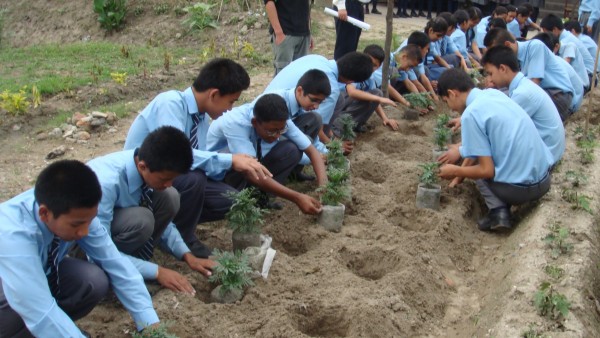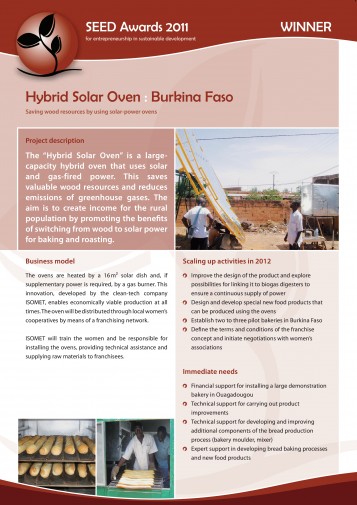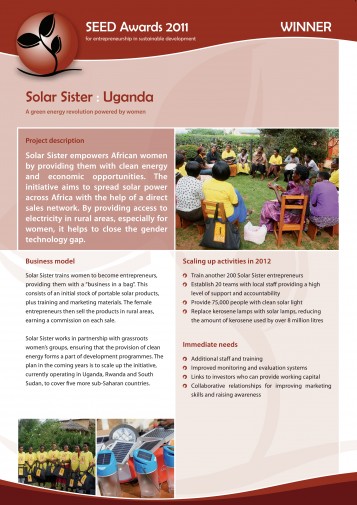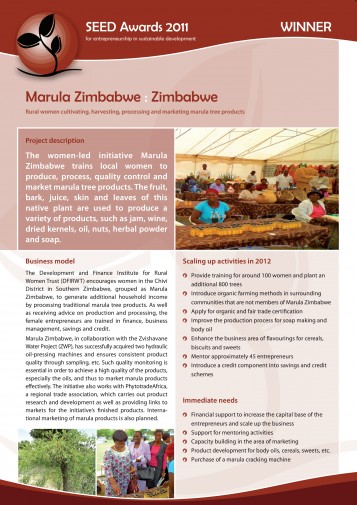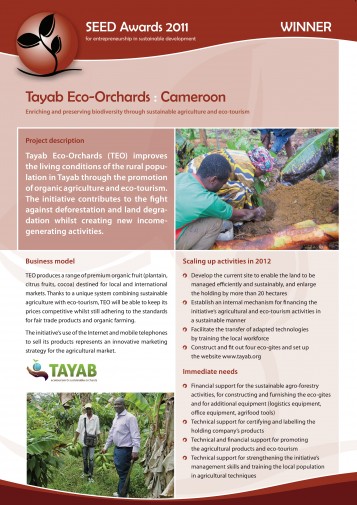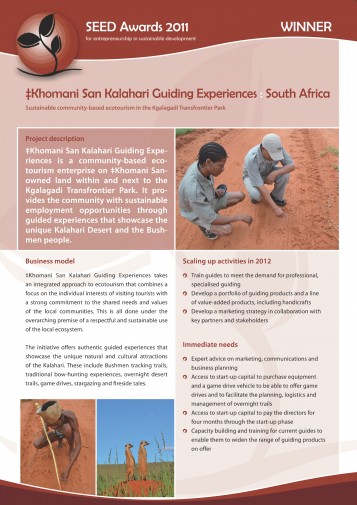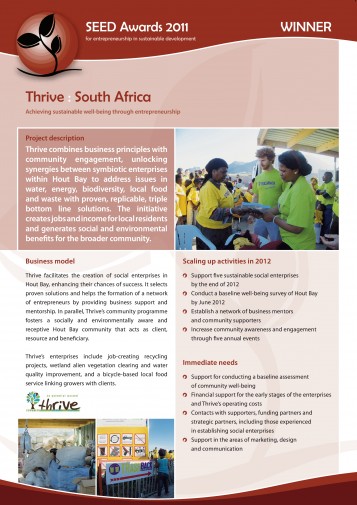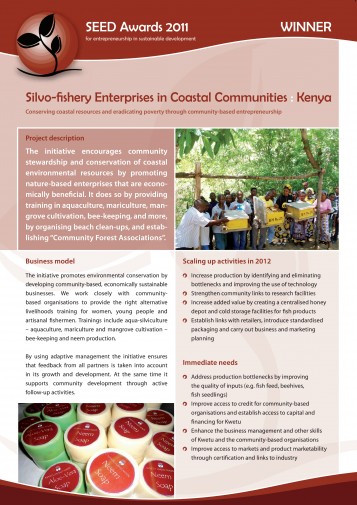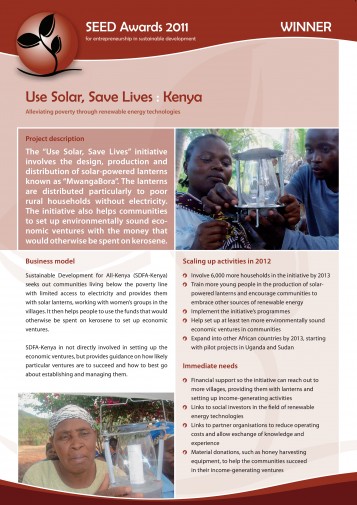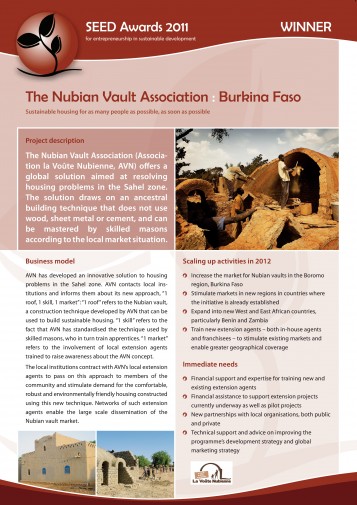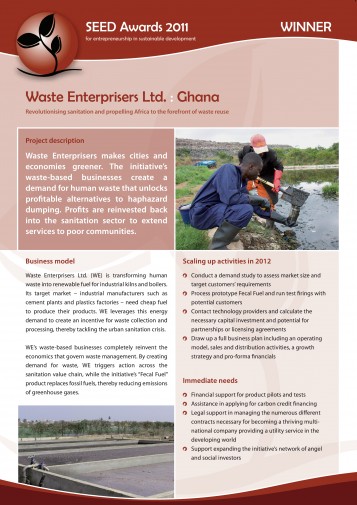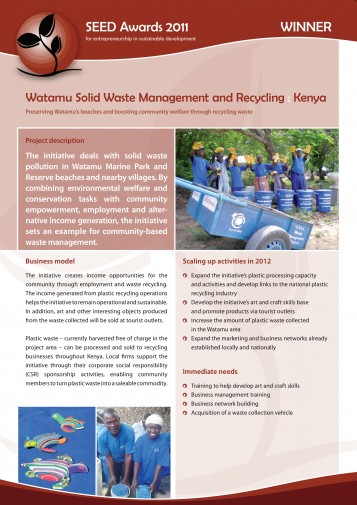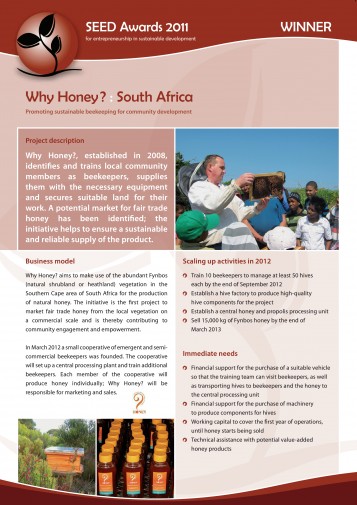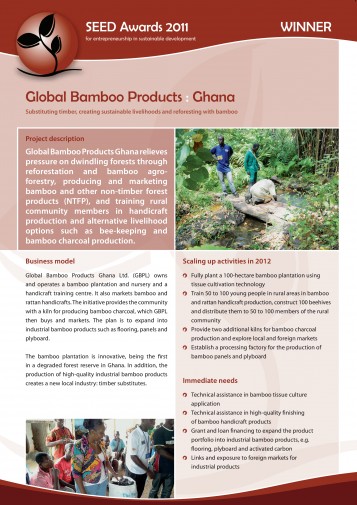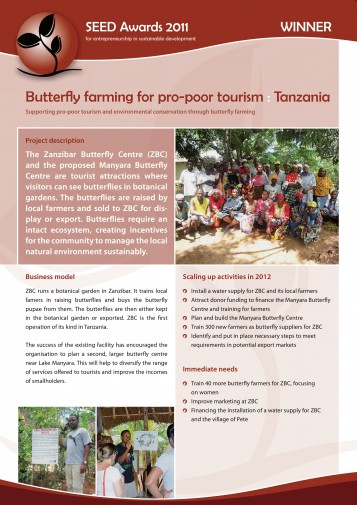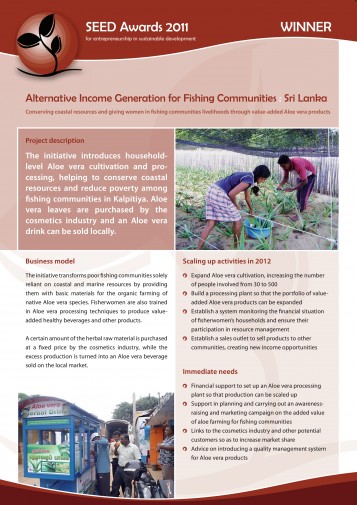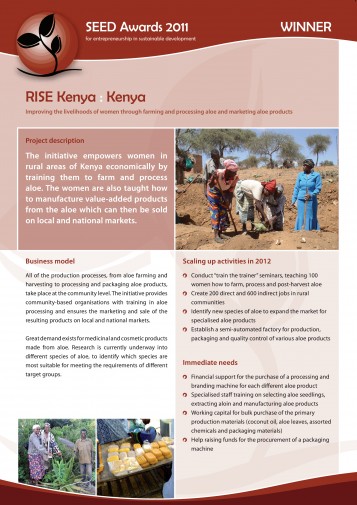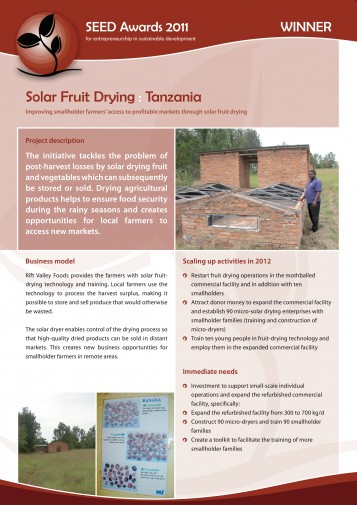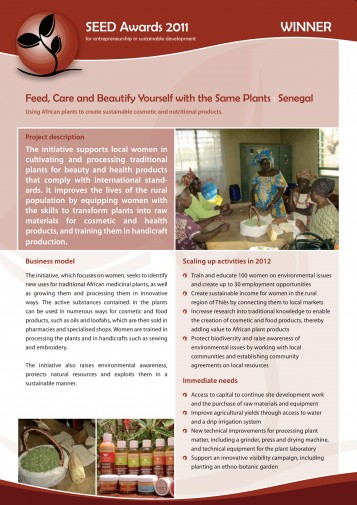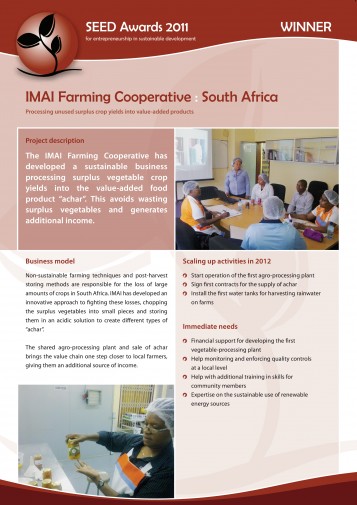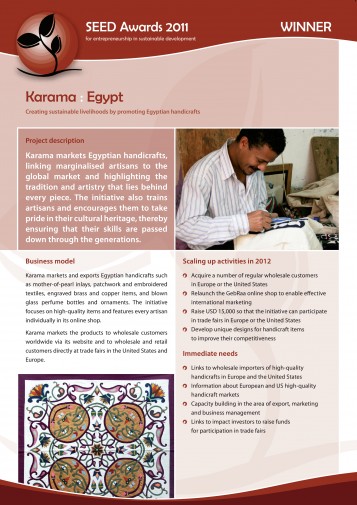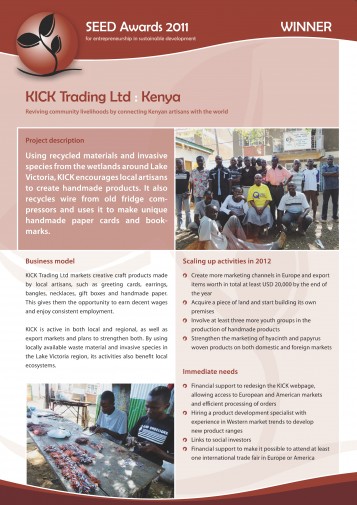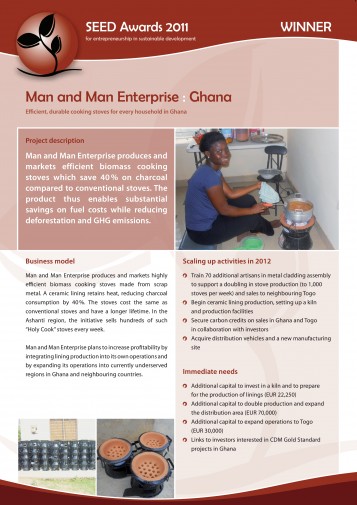2011 SEED Annual Report is out!
Published: 13 December 2011
2011 was a remarkable year for SEED, where a record number of SEED winners were awarded. Read the new Annual Report to learn about SEED's significant expansion, and how SEED offers an ever-more comprehensive package of support. Read more
SDGs:





Enterprise Brief: ISOMET Sarl
Published: 30 August 2011
The “Hybrid Solar Oven” is a large capacity hybrid oven that uses solar and gas-fired power. This saves valuable wood resources and reduces emissions of greenhouse gases. The aim is to create income for the rural population by promoting the benefits of switching from wood to solar power for baking and roasting. Read more
SDGs:









Enterprise Brief: Solar Sister
Published: 30 August 2011
Solar Sister empowers African women by providing them with clean energy and economic opportunities. The initiative aims to spread solar power across Africa with the help of a direct sales network. By providing access to electricity in rural areas, especially for women, it helps to close the gender technology gap. Read more
SDGs:











Enterprise Brief: Women Environment Preservation Committee (WEPCO)
Published: 30 August 2011
The initiative seeks to enhance environmental conservation while generating income from recycled household waste, mainly in Kathmandu Valley. Women are provided with business and waste management training and access to micro-credit loans, and are encouraged to form conservation groups across the country. Read more
SDGs:







Enterprise Brief: Marula Zimbabwe
Published: 30 August 2011
The women-led initiative Marula Zimbabwe trains local women to produce, process, control the quality of, and market marula tree products. The fruit, bark, juice, skin, and leaves of this native plant are used to produce a variety of products, such as jam, wine, dried kernels, oil, nuts, herbal powder, and soap. Read more
SDGs:









Enterprise Brief: AGRIPO
Published: 30 August 2011
Tayab Eco-Orchards (TEO) improves the living conditions of the rural population in Tayab through the promotion of organic agriculture and eco-tourism. The initiative contributes to the fight against deforestation and land degradation whilst creating new income generating activities. Read more
SDGs:





Enterprise Brief: The Development of a Khomani San Cultural and Nature Guiding Enterprise and Association
Published: 30 August 2011
Khomani San Kalahari Guiding Experiences is a community-based eco-tourism enterprise on Khomani San-owned land within and next to the Kgalagadi Transfrontier Park. It provides the community with sustainable employment opportunities through guided experiences that showcase the unique Kalahari Desert and the Bushmen people. Read more
SDGs:







Enterprise Brief: Thrive
Published: 30 August 2011
Thrive combines business principles with community engagement, unlocking synergies between symbiotic enterprises within Hout Bay to address issues in water, energy, biodiversity, local food, and waste with proven, replicable, triple bottom line solutions. The initiative creates jobs and income for local residents and generates social and environmental benefits for the broader community. Read more
SDGs:









Enterprise Brief: Upscaling the siliviculture based enterprises of coastal communities in Kenya
Published: 30 August 2011
The initiative encourages community stewardship and conservation of coastal environmental resources by promoting nature-based enterprises that are economically beneficial. It does so by providing training in aquaculture, mariculture, mangrove cultivation, bee-keeping, and more, by organising beach clean-ups, and establishing “Community Forest Associations” Read more
SDGs:







Enterprise Brief: Sustainable Development For All
Published: 30 August 2011
The “Use Solar, Save Lives” initiative involves the design, production and distribution of solar-powered lanterns known as “MwangaBora”. The lanterns are distributed particularly to poor rural households without electricity. The initiative also helps communities to set up environmentally sound economic ventures with the money that would otherwise be spent on kerosene. Read more
SDGs:









Enterprise Brief: Nubian Vault Association
Published: 30 August 2011
The Nubian Vault Association (Association la Voûte Nubienne, AVN) offers a global solution aimed at resolving housing problems in the Sahel zone. The solution draws on an ancestral building technique that does not use wood, sheet metal or cement, and can be mastered by skilled masons according to the local market situation. Read more
SDGs:







Enterprise Brief: Waste Enterprisers
Published: 30 August 2011
Waste Enterprisers makes cities and economies greener. The initiative’s waste-based businesses create a demand for human waste that unlocks profitable alternatives to haphazard dumping. Profits are reinvested back into the sanitation sector to extend services to poor communities. Read more
SDGs:







Enterprise Brief: Watamu Community Solid Waste Management and Recycling Enterprises
Published: 30 August 2011
The initiative deals with solid waste pollution in Watamu Marine Park and Reserve beaches and nearby villages. By combining environmental welfare and conservation tasks with community empowerment, employment and alternative income generation, the initiative sets an example for community-based waste management. Read more
SDGs:









Enterprise Brief: Why Honey
Published: 30 August 2011
Why Honey?, established in 2008, identifies and trains local community members as beekeepers, supplies them with the necessary equipment and secures suitable land for their work. A potential market for fair trade honey has been identified; the initiative helps to ensure a sustainable and reliable supply of the product. Read more
SDGs:









Enterprise Brief: Global Bamboo Products
Published: 29 August 2011
Global Bamboo Products Ghana relieves pressure on dwindling forests through reforestation and bamboo agroforestry, producing and marketing bamboo and other non-timber forest products (NTFP), and training rural community members in handicraft production and alternative livelihood options such as bee-keeping and bamboo charcoal production. Read more
SDGs:









Enterprise Brief: Butterfly farming for pro poor tourism and environment conservation
Published: 29 August 2011
The Zanzibar Butterlfy Centre (ZBC) and the proposed Manyara Butterfly Centre are tourist attractions where visitors can see butterflies in botanical gardens. The butterflies are raised by local farmers and sold to ZBC for display or export. Butterflies require an intact ecosystem, creating incentives for the community to manage the local natural environment sustainably. Read more
SDGs:





Enterprise Brief: Community-based, sustainable and commercially viable Aloe vera products as alternative income generation for fisherwomen in Bar Reef Special Management Area in Kalpitiya
Published: 29 August 2011
The initiative introduces householdlevel Aloe vera cultivation and processing, helping to conserve coastal resources and reduce poverty among fishing communities in Kalpitiya. Aloe vera leaves are purchased by the cosmetics industry and an Aloe vera drink can be sold locally. Read more
SDGs:









Enterprise Brief: RISE Kenya
Published: 29 August 2011
The initiative empowers women in rural areas of Kenya economically by training them to farm and process aloe. The women are also taught how to manufacture value-added products from the aloe which can then be sold on local and national markets. Read more
SDGs:







Enterprise Brief: FADECO Trading Co. Ltd.
Published: 29 August 2011
The initiative tackles the problem of post-harvest losses by solar drying fruit and vegetables which can subsequently be stored or sold. Drying agricultural products helps to ensure food security during the rainy seasons and creates opportunities for local farmers to access new markets. Read more
SDGs:







Enterprise Brief: Dr Marie Dialo Labortoires
Published: 29 August 2011
The initiative supports local women in cultivating and processing traditional plants for beauty and health products that comply with international standards. It improves the lives of the rural population by equipping women with the skills to transform plants into raw materials for cosmetic and health products, and training them in handicraft production. Read more
SDGs:







Enterprise Brief: GreenTech Company Ltd - fuel briquettes from groundnut shells combined with fuel efficient stoves
Published: 29 August 2011
Since July 2011, GreenTech produces high quality fuel briquettes from groundnutshells and promotes fuel efficient stoves for cooking and heating purposes in households, restaurants and industries. As the combined briquette/stove unit needs less fuel input than common cooking units, it reduces cooking costs, emissions and the exploitation of forests. The briquettes are pressed by a heavy duty machine, producing 800kg/h. The stoves are produced with recycled metal by local weldermen. Briquettes and stoves are available on stock. Read more
SDGs:







Enterprise Brief: Imai Farming Cooperative
Published: 29 August 2011
The IMAI Farming Cooperative has developed a sustainable business processing surplus vegetable crop yields into the value-added food product “achar”. This avoids wasting surplus vegetables and generates additional income. Read more
SDGs:







Enterprise Brief: Karama
Published: 29 August 2011
Karama markets Egyptian handicrafts, linking marginalised artisans to the global market and highlighting the tradition and artistry that lies behind every piece. The initiative also trains artisans and encourages them to take pride in their cultural heritage, thereby ensuring that their skills are passed down through the generations. Read more
SDGs:









Enterprise Brief: GebRaa
Published: 29 August 2011
Using recycled materials and invasive species from the wetlands around Lake Victoria, KICK encourages local artisans to create handmade products. It also recycles wire from old fridge compressors and uses it to make unique handmade paper cards and bookmarks. Read more
SDGs:









Enterprise Brief: Man and Man Enterprise
Published: 29 August 2011
Man and Man Enterprise produces and markets efficient biomass cooking stoves which save 40 % on charcoal compared to conventional stoves. The product thus enables substantial savings on fuel costs while reducing deforestation and GHG emissions. Read more
SDGs:








